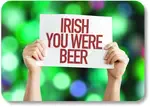- Home
- Irish Customs
- History
Ireland History: Find Out Where Irish Expressions Came From - The Fun Way!
This will not be your average Ireland history lesson. Think of this page as one way to tell the story of Ireland, from the beginning to the present - in an entertaining way that you may want to share with your friends!
Want a true online Irish experience?
Click here to start your fun, free IE Passport Journey!
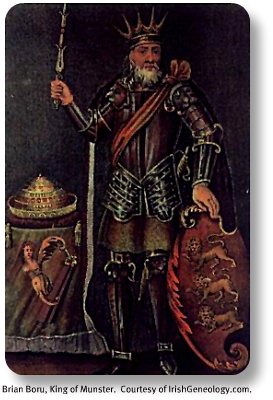
Have you ever wanted to know a little more about your Irish heritage - Irish heroes, where Irish legends came from, what your Irish ancestors were up to?
This is a great place to start! You may even turn some of this information into unique Irish expressions of your own!
Ireland history is long (being history and all), but far from boring! Let’s start in the early days, where there was no beer, no potatoes, and no Lord of the Dance.
Ireland History: The Early Years (10,000 - 100 BC)
A lot of the things that are known about Ireland in the early years can only be found in mythology, poems, and a lot of digging in the dirt.
The first settlers are believed to have arrived in Ireland around 10,000 BC, and these people were considered hunters.
Farmers arrived in Ireland a few thousand years later (around 5,000 BC), and they settled down in the hills and plains of Ireland to grow pretty much anything that could survive in so much rain.
They had axe heads that helped them to cut down trees, but they were soon put out of business (3000 years later in 2000 BC) by the Bronze Age’s beginning.
More and more people soon began to arrive in Ireland by the 1200s BC, and the first crannog (artificial island) dwellers began to make their homes in the soggy parts of the country.
The Celts arrived in Ireland around the 600s BC, and they held sway in Ireland until Christianity arrived years later. These were Celts from central Europe, whereas the Celts from the Switzerland area only reached Ireland in 200 BC.
At this time, the country was separated into roughly 150 tuaths, or mini kingdoms, which were ruled by a king of many tuaths, who was ruled by one of the kings of the five provinces of Ireland.
The Gaels arrived in 100 BC, confusing everyone with their language and making sure that only a very few people understood what the other person was saying.
Ireland History - After The Early Years (100 - 400 AD)
During this next part of Irish history, not a lot has been recorded.
The Romans had conquered Britain and parts of Scotland, but they never conquered Ireland (it was too rainy for them, probably).
Their influence extended into Ireland, along with some Roman weapons that were used by an exiled prince to take back his island.
The High Kingship began in 200 AD, located at Tara, Co Meath.
Ireland was soon inhabited by the Scoti in 300 AD, during the time that has come to be known as the Irish Dark Age.
The Scoti actually attacked Britain and settled there during the Great Conspiracy in 367 AD, and thus Scotland was populated.
Ireland History: Arrival of Christianity (400-800 AD)
Irish history was graced by the visit of St. Patrick in 432 AD, and his work to convert the Irish from paganism to Christianity is the reason that the Irish worship God instead of trees, bushes and rocks.
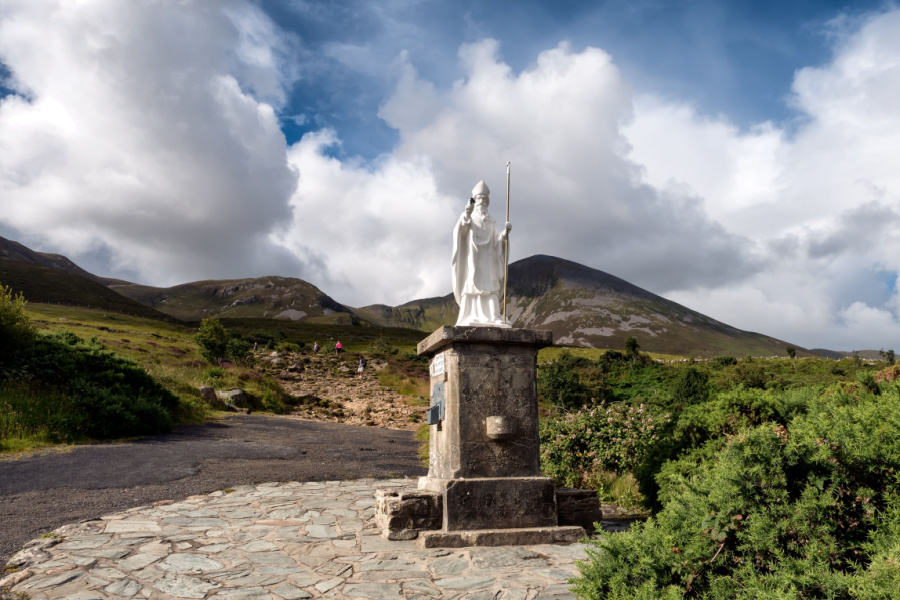
Palladius was the first bishop of Ireland sent
in 431 AD by the Pope, meaning that there were already Christians
populating Ireland.
This has led many experts to believe that Christian missionaries had already been living in Ireland before this date, but this is the first official arrival of Christ.
During this time, many wars were fought by people with hard to pronounce names.
Ireland History: The Vikings (800 - 1166 AD)
795 AD was actually the first recorded raid by the Vikings into Ireland, and these raids were usually quick and designed to steal cattle and loot.
However, the Vikings soon began to establish settlements in the country, including what is now Dublin.
They never quite managed to take control of the island thanks to the stubborn resistance of the Irish, but they were a major part of Irish history.
Ireland History: The Normans (1166 - 1536 AD)
Ireland was divided by the time the 12th century rolled around, meaning that the Normans who invaded Ireland didn’t fight against a united army.
The Normans controlled most of the east coast of Ireland, all the way up to Ulster and well into the island.
However, the Normans soon lost control, and the Irish were beginning to conquer their land as soon as 1261 BC.
The Black Death rolled through Ireland in 1348, and it wiped out many of the English and Norman settlers that lived in far denser settlements than the Irish.
By the 15th century’s end, there was almost no English authority in Ireland.
Ireland History: Early Modern Age (1536-1691 AD)
Ireland was conquered by Henry VIII, and it was made a Kingdom of Britain in 1541.
Queen Elizabeth and King James I both re-conquered Ireland during the Desmond Rebellions and the Nine Years War, and the land was ruled by a British government.
The 17th century is considered one of the bloodiest in Irish history, as there were two periods when war was constantly raging.
These were the Rebellion of 1641 and the Williamite War of 1689.
Ireland History: The Rest
The Protestants (1691 – 1801 AD)
1691 saw the end of the Jacobite resistance, and the Penal Laws that the British had enforced in years past were restored.
Thus started the antagonism between Irish and English.
The Irish ruling class was part British, but they saw Ireland as their country and thus tried to establish more favorable relationships for trade and commerce between England and Ireland.
This ruling class was primarily Protestant.
The Potato Famine (1740 – 1741 AD)
The Great Famine is one of the most important parts of Irish history, as over 150,000 natives emigrated from the country after 400,000 Irish died.
It was caused by many things, including the fact that the potato was one of the main foods eaten by the Irish people.
The potato blight in Ireland caused the loss of more than 50% of the potatoes in 1807, with the crop of 1821 and 22 being lost completely.
Joining the British (1801 – 1912 AD)
The Acts of Union was established in 1801 after the Irish Rebellion of 1798, and Ireland soon became a part of Great Britain.
Daniel O’Connell started his work to emancipate his country in 1823, and all of the Irish efforts to emancipate themselves culminated in 1912 with the War of Independence.
The Great Nation (1912 AD – 1922)
1916 to 1921 saw a lot of upheaval and political violence, and the IRA began to wage war on the British until 1921.
The Anglo-Irish Treaty was signed in 1921, creating the Irish Free State and giving the Irish their freedom from English rule.
And the rest is ... er... history!
More Fun With Irish Expressions
Congratulations on learning more about the Emerald Isle and discovering what we like to call your "Irish Side." You may be thinking "I'd love to actually VISIT Ireland but that's really not in the cards right now. What am I supposed to do with the stuff I just learned?"
Well never fear! Since 2007 we have collected all of the best printable, shareable resources we could find, to help you put your new knowledge of Ireland to good use. We've put them all together in a single download we call "Your Irish Expressions Playbook," which contains over 100 pages of games, puzzles, recipes, songbooks, quizzes, travel guides and much, much more.
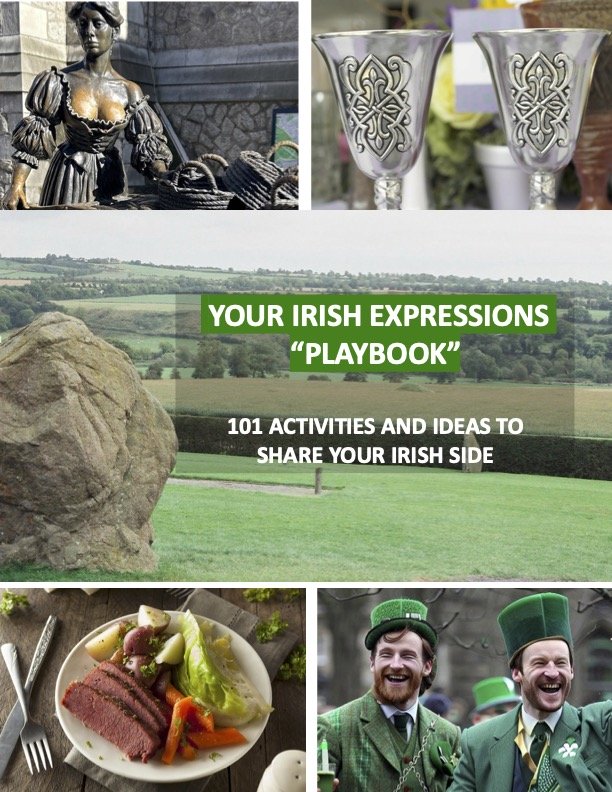
Purchase them ALL for one small price, print as many copies as you like and share them with your friends - with no limitations! But order soon - we are already adding to the Playbook for future editions and this price will not last long.
Oh, want one more reason to order right away? If you buy YOUR copy of the Playbook now, you will be allowed to upgrade to any new future edition for FREE.
PRO TIP: Be sure to click the 'return to merchant' button following checkout, to ensure you are routed to the page where you can download your Playbook. Any issues? Just reach out to us at support@irish-expressions.com and we will make it right.
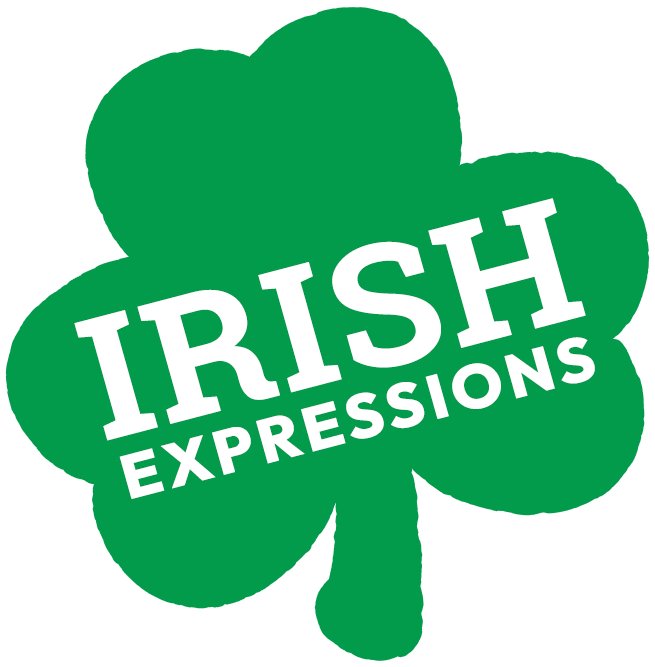
Please Share Your Feedback
Did we miss anything? Is there a topic you would like us to cover in the future? Tap HERE to let us know!



